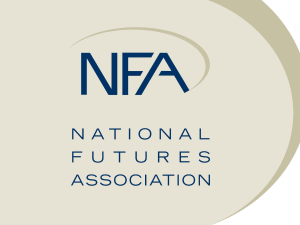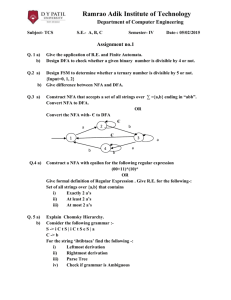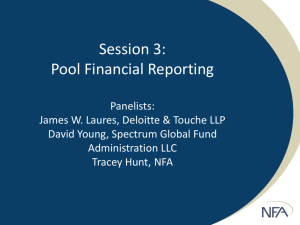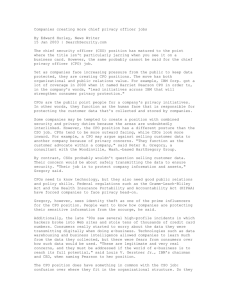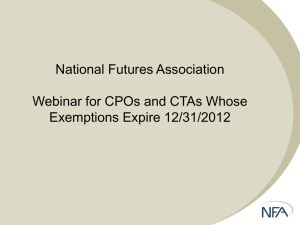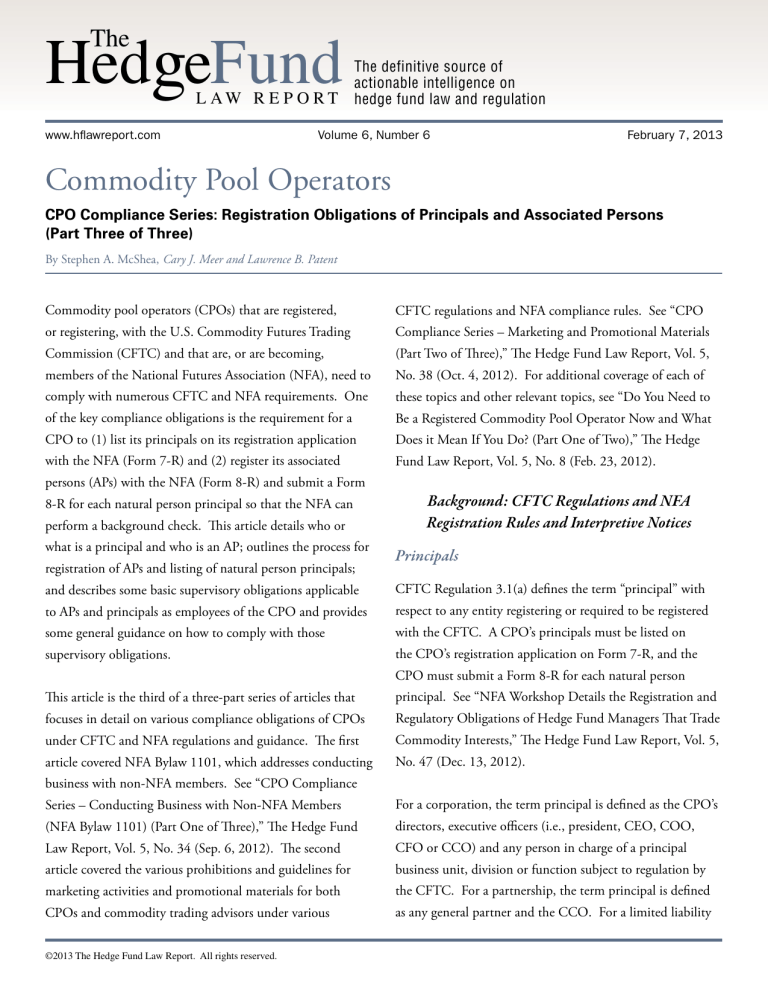
HedgeFund
The
L AW R E P O RT
www.hflawreport.com
The definitive source of
actionable intelligence on
hedge fund law and regulation
Volume 6, Number 6
February 7, 2013
Commodity Pool Operators
CPO Compliance Series: Registration Obligations of Principals and Associated Persons
(Part Three of Three)
By Stephen A. McShea, Cary J. Meer and Lawrence B. Patent
Commodity pool operators (CPOs) that are registered,
CFTC regulations and NFA compliance rules. See “CPO
or registering, with the U.S. Commodity Futures Trading
Compliance Series – Marketing and Promotional Materials
Commission (CFTC) and that are, or are becoming,
(Part Two of Three),” The Hedge Fund Law Report, Vol. 5,
members of the National Futures Association (NFA), need to
No. 38 (Oct. 4, 2012). For additional coverage of each of
comply with numerous CFTC and NFA requirements. One
these topics and other relevant topics, see “Do You Need to
of the key compliance obligations is the requirement for a
Be a Registered Commodity Pool Operator Now and What
CPO to (1) list its principals on its registration application
Does it Mean If You Do? (Part One of Two),” The Hedge
with the NFA (Form 7-R) and (2) register its associated
Fund Law Report, Vol. 5, No. 8 (Feb. 23, 2012).
persons (APs) with the NFA (Form 8-R) and submit a Form
8-R for each natural person principal so that the NFA can
perform a background check. This article details who or
what is a principal and who is an AP; outlines the process for
registration of APs and listing of natural person principals;
Background: CFTC Regulations and NFA
Registration Rules and Interpretive Notices
Principals
and describes some basic supervisory obligations applicable
CFTC Regulation 3.1(a) defines the term “principal” with
to APs and principals as employees of the CPO and provides
respect to any entity registering or required to be registered
some general guidance on how to comply with those
with the CFTC. A CPO’s principals must be listed on
supervisory obligations.
the CPO’s registration application on Form 7-R, and the
CPO must submit a Form 8-R for each natural person
This article is the third of a three-part series of articles that
principal. See “NFA Workshop Details the Registration and
focuses in detail on various compliance obligations of CPOs
Regulatory Obligations of Hedge Fund Managers That Trade
under CFTC and NFA regulations and guidance. The first
Commodity Interests,” The Hedge Fund Law Report, Vol. 5,
article covered NFA Bylaw 1101, which addresses conducting
No. 47 (Dec. 13, 2012).
business with non-NFA members. See “CPO Compliance
Series – Conducting Business with Non-NFA Members
For a corporation, the term principal is defined as the CPO’s
(NFA Bylaw 1101) (Part One of Three),” The Hedge Fund
directors, executive officers (i.e., president, CEO, COO,
Law Report, Vol. 5, No. 34 (Sep. 6, 2012). The second
CFO or CCO) and any person in charge of a principal
article covered the various prohibitions and guidelines for
business unit, division or function subject to regulation by
marketing activities and promotional materials for both
the CFTC. For a partnership, the term principal is defined
CPOs and commodity trading advisors under various
as any general partner and the CCO. For a limited liability
©2013 The Hedge Fund Law Report. All rights reserved.
HedgeFund
The
The definitive source of
actionable intelligence on
hedge fund law and regulation
L AW R E P O RT
www.hflawreport.com
Volume 6, Number 6
February 7, 2013
company or limited liability partnership, the term principal
Finally, the definition of principal includes any natural
is defined as any executive officers, managers or managing
person who, directly or indirectly, creates or uses a trust,
members, or those members vested with the management
proxy, power of attorney, pooling arrangement or any other
authority for the entity, and any person in charge of a
contract, arrangement, or device with the purpose or effect
principal business unit, division or function subject to
of divesting such person of direct or indirect ownership of a
regulation by the CFTC. Additionally, the term principal
voting security of the CPO, or preventing the vesting of such
is defined to include any person having a similar status or
ownership, or of avoiding making a contribution of 10% or
performing similar functions as any of the foregoing who
more of the capital of the CPO, as part of a plan or scheme
has the power, directly or indirectly, through agreement or
to evade being deemed a principal of the entity. CFTC
otherwise, to exercise a controlling influence over the CPO’s
Regulation 3.1(a)(4).
activities that are subject to regulation by the CFTC. CFTC
Regulation 3.1(a)(1).
There are also certain tests with respect to 10% ownership,
Associated Persons
Definition and General Background
profit rights, control and capital contribution that will cause
CFTC Regulation 1.3(aa)(3) defines a CPO’s APs as any
an individual or entity to be a principal of a CPO, which are
natural person associated with a CPO as a partner, officer,
as follows:
employee, consultant or agent (or any person occupying
a similar status or performing similar functions) involved
1. any natural person who, directly or indirectly, owns, is
in soliciting funds, securities or property for participation
entitled to vote, or has the power to sell or direct the
in a commodity pool or any person who supervises such
sale of, 10% or more of any class of the CPO’s voting
person. CFTC Regulation 3.12(a) requires a CPO’s APs to be
securities;
registered under the Commodity Exchange Act (CEA), unless
2. any natural person who, directly or indirectly, is entitled
to receive 10% or more of the CPO’s profits;
3. any natural person who, directly or indirectly, has the
eligible for one of the exemptions from registration under
CFTC Regulation 3.12(h). To the extent a CPO’s pool trades
swaps, directly or indirectly, the CPO must also register as a
power to exercise a controlling influence over the CPO’s
“swaps firm” and designate one of its principals who is also
activities that are subject to regulation by the CFTC;
registered as an AP as a “swaps AP.” (A detailed discussion
4. any entity that is the direct owner of 10% or more of any
of registration as a swaps firm and swaps AP is beyond the
class of the CPO’s voting securities; and
5. any natural person or entity who has contributed 10% or
scope of this article. Details on these designations and the
process for obtaining them are available in NFA Notice I-12-
more of the CPO’s capital (except for banks or insurance
24.) To be eligible for registration as an AP, NFA Registration
companies that are not affiliated with the CPO that
Rule 401 requires that a CPO’s APs must have taken one of
contribute capital through subordinated debt that is not
the applicable proficiency exams or otherwise satisfied the
guaranteed by another party not listed as a principal of
proficiency exam requirements of Rule 401, unless an exam
the CPO). CFTC Regulation 3.1(a)(2) and (3).
waiver is available under NFA Registration Rule 402.
©2013 The Hedge Fund Law Report. All rights reserved.
HedgeFund
The
The definitive source of
actionable intelligence on
hedge fund law and regulation
L AW R E P O RT
www.hflawreport.com
Volume 6, Number 6
In determining who are a CPO’s APs, it is important to
February 7, 2013
been found in such a proceeding to have committed fraud
that may disqualify the person from being listed as a
principal or an AP; and (d) the CPO files with the NFA
a resolution stating that (i) such person is not authorized
to solicit or accept customers’, retail forex customers’ or
leverage customers’ orders, solicit a client’s or prospective
client’s discretionary account, solicit funds, securities or
property for participation in a commodity pool, exercise
any line supervisory authority over such persons, or hire
or fire firm personnel engaged in activities subject to
regulation under the CEA; (ii) another registered AP or
AP-applicant of the CPO who is not subject to a pending
proceeding brought by the CFTC or a self-regulatory
organization alleging fraud or failure to supervise, and
has not been found to have committed fraud or failure to
supervise, holds and exercises full and final supervisory
authority, including authority to hire and fire personnel,
over the customer commodity interest related activities
of the CPO; and (iii) if that AP so designated by the
foregoing item (ii) ceases to have the authority referenced
in the foregoing item (ii), the CPO will notify the NFA
within 20 days by filing a subsequent resolution, which
must also include the name of another AP who has been
vested with the same full supervisory authority in the
event that all of those APs previously designated have
been relieved of such authority;
engaged in any AP activity from outside of the United
States and limits his or her activities to soliciting
customers outside of the United States;
registered as a CPO;
exempt from registration as a CPO under CFTC
Regulation 4.13 (unless the CPO with whom the person
is associated is registered as a CPO);
associated with a person who is exempt from registration
as a CPO under CFTC Regulation 4.13 (unless that
or failed to supervise; (c) the person seeking exemption
person is associated with a registered CPO); or
keep in mind that, even where a CPO may have a dedicated
marketing team, its APs may not necessarily be limited to the
individuals on that marketing team and the person or persons
to whom that marketing team reports. It is important to
consider, for example, if the CPO’s portfolio managers or
others, such as executive officers, are in fact actively involved
in solicitation activities via pitches to potential investors.
Exemptions from Registration as an AP
Under CFTC Regulation 3.12(h)(1) and (3), an AP of a CPO
is exempt from registration if he or she is:
1. individually registered as a futures commission merchant,
retail forex dealer, swap dealer, major swap participant
(which is unlikely in any of the foregoing categories),
floor broker or introducing broker;
2. engaged in the solicitation of funds, securities, or
property for a participation in a commodity pool, or the
supervision of any person or persons so engaged, pursuant
to registration with Financial Industry Regulatory
Authority (FINRA) as a registered representative,
registered principal, limited representative or limited
principal, and that person does not engage in any other
activity subject to regulation by the CFTC;
3. the chief operating officer, general partner or other person
4.
in the supervisory chain of command, provided that (a)
the CPO derives no more than 10% of its total revenue
on an annual basis from commodity interest transactions
5.
6.
for customers; (b) the CPO is not subject to a pending
proceeding brought by the CFTC or a self-regulatory
organization alleging fraud or failure to supervise or has
is listed as a principal and has no derogatory information
©2013 The Hedge Fund Law Report. All rights reserved.
7.
8. where a commodity pool is operated by two or more
HedgeFund
The
L AW R E P O RT
www.hflawreport.com
The definitive source of
actionable intelligence on
hedge fund law and regulation
Volume 6, Number 6
February 7, 2013
CPOs, registered as an AP of one of the CPOs, provided
NFA Registration Rule 401 also provides that the proficiency
that each such CPO shall be jointly and severally liable
exam requirement will be deemed satisfied if:
for the conduct of that AP in the solicitation of funds,
securities or property for participation in the commodity
pool, or the supervision of any persons so engaged,
regardless of whether that AP is registered as an AP of
each such CPO.
Proficiency Exam Requirements for APs
An AP would generally satisfy the NFA Registration Rule 401
proficiency exam requirements by taking (and passing) the
National Commodity Futures Examination, known as the
Series 3. NFA Registration Rule 401 also provides three other
exams that APs may take to satisfy the exam requirement in
1. the AP is registered with FINRA as a general securities
representative (GSR) of his or her sponsor and the AP is
going to limit future activities on behalf of the sponsor
to (a) referring clients to APs of the sponsor who have
satisfied the requirements of Rule 401 (which referrals
are solely incidental to his or her business as a GSR); or
(b) supervising persons who perform these same limited
activities; or
2. the AP limits his or her activities to (a) soliciting persons
for participation in a commodity pool that either (i)
exclusively trades swaps subject to the jurisdiction of the
certain circumstances – Series 31, Series 32 and Series 33. The
CFTC or (ii) would have met the de minimis trading
Series 31 exam may be used by individuals with a Series 7
limitations in CFTC Regulations 4.5 or 4.13(a)(3) but
held by their CPO (i.e., their CPO must also be a registered
for the inclusion of swaps; or (b) supervising on behalf of
broker-dealer – it is not sufficient for the CPO simply to be an
the sponsor persons who perform such limited activities.
affiliate of a broker-dealer) that limit their futures activities on
behalf of the CPO to soliciting customers for participation in a
Where a CPO’s APs do not satisfy any of Registration
commodity pool or for discretionary accounts to be managed by
Rule 401’s examination requirements or any of it express
commodity trading advisors. The Series 32 exam may be used
exemptions, a CPO may be able to obtain an exemption
by individuals who, within two years of the filing of their AP
from the examination requirements under NFA Registration
application, have been registered or licensed to solicit customer
Rule 402, which provides the NFA’s Vice-President of
business in futures in the United Kingdom or Canada, provided
Registration and Membership with the authority to waive the
such registration meets certain conditions established by the
requirements of Registration Rule 401 under circumstances
NFA. The Series 33 exam may be used by individuals with
approved by the NFA’s Board of Directors. The NFA’s Board
a Series 7 and who are going to limit their futures activities
of Directors has set forth the circumstances under which such
on behalf of their sponsor to soliciting or accepting customer
an examination waiver may be obtained in NFA Interpretive
orders for futures or options involving stock index, currency
Notice 9018. Interpretive Notice 9018 grants the NFA’s
or interest rate products or security futures products, or
Director of Compliance the authority to waive the Series 3
supervising persons who perform these same limited activities.
examination for individuals who are APs of CPOs that are
A person may rely upon passing these examinations for two
required to register solely because they operate commodity pools
years following termination of his or her registration.
that are principally engage in securities transactions where:
©2013 The Hedge Fund Law Report. All rights reserved.
HedgeFund
The
The definitive source of
actionable intelligence on
hedge fund law and regulation
L AW R E P O RT
www.hflawreport.com
Volume 6, Number 6
February 7, 2013
1. the AP’s CPO (a) is regulated by a federal or state
It is important to note that any such waiver so obtained covers
regulator (such as the Securities and Exchange
all APs of the firm – that is, it is firm-specific, not AP-specific.
Commission) or (b) operates a pool that is privately
It is also possible to obtain a waiver under item (1) above for
offered under Regulation D, and the CPO limits its
a specific division or group within the firm, if the division
activities for which registration is required to operating a
commodity pool that (i) engages principally in securities
transactions; (ii) commits only a small percentage of assets
as initial margin deposits and premiums for futures and
options on futures; and (iii) uses futures transactions and
options on futures only for hedging or risk management
purposes; or
2. (a) the individual requesting the waiver is a general
partner of a CPO or of a commodity pool that is
primarily involved with securities investments; (b) there is
at least one registered general partner of the CPO or pool
who has taken and passed the Series 3 examination; and
(c) the individual requesting the waiver is not involved
in soliciting or accepting pool participations, trading
futures or options on futures, handling customer funds,
or group satisfies the condition of item (1), but the firm as a
whole does not. Any firm that has been granted a waiver with
respect to its APs that later becomes ineligible for the waiver
must promptly notify the Vice-President of Registration and
Membership in writing of such ineligibility.
Supervisory Obligations
NFA Compliance Rule 2-9 requires each NFA member to
diligently supervise its employees and agents in the conduct of
their commodity futures activities on behalf of the member.
While applicable to all employees, including principals and
APs, compliance with Rule 2-9 is particularly important with
respect to APs given their role in marketing activities. NFA
supervising any of the above activities or engaging in any
Interpretive Notices 9019 and 9021 provide some guidance
other activity that is integral to the operation of the fund
on the steps that a CPO can take to seek to ensure compliance
as a pool.
with Rule 2-9, which are discussed below under ‘How to
NFA staff has also granted examination waivers for persons
who were previously registered; then de-registered because the
firm for which they worked was able to claim exemption from
registration, and are now required to re-register because certain
Comply – Supervision.’
In addition, pursuant to NFA Interpretive Notice 9042,
CPOs who are also registered broker-dealers whose APs are
exemptions/exclusions at the firm level are no longer available.
engaged in security futures activities need to ensure that such
The individual or firm requesting the examination waiver, or
interview or group meeting, conducted by persons designated
their counsel, must provide a written description of the facts
by the CPO, at which compliance matters relevant to the AP’s
that qualify the individual for the waiver to the Director of
security futures activities are discussed. That interview or
Compliance of the NFA.
meeting may include other matters.
©2013 The Hedge Fund Law Report. All rights reserved.
APs participate, no less than once a year, in an individual
HedgeFund
The
The definitive source of
actionable intelligence on
hedge fund law and regulation
L AW R E P O RT
www.hflawreport.com
Volume 6, Number 6
How to Comply
Registration of APs and Listing of Natural Person
Principals
February 7, 2013
one, which can be done via a link under the “Individuals”
heading in the “Apply for Registration” page.
The fingerprint cards must be mailed to the NFA directly. The
The basic steps for registration of a CPO’s APs and listing of
standard form of FBI fingerprint card available at a local police
its natural person principals are as follows:
station may be used for this purpose and individual principals
and APs can get fingerprinted at their local police office.
1. Completion of Form 8-R via the NFA’s online
registration system (ORS), including a verification of the
In registering APs and listing principals, it is important to
information by the individual applicant;
complete all the steps, beyond simply filing the Form 8-R
2. The CPO sponsor must attempt to verify an AP’s
on ORS, in a timely manner to ensure that the registration
previous employers and educational institutions for the
is completed successfully. Once the Form 8-R is completed
past three years;
online, APs will be granted temporary licenses if they have no
3. Submission of fingerprint cards for individuals (two
copies are recommended); and
4. Payment of a non-refundable application fee of $85 to
the NFA.
It is very important to complete all of the disciplinary history
questions on Form 8-R carefully. If an AP applicant fails
to disclose a disciplinary event and the NFA discovers the
event through a background check, the failure to disclose
the event could cause an applicant to be rejected, even if the
disciplinary event itself would not have caused the applicant
to be rejected.
“yes” answers to the Disciplinary History questions, or if the
“yes” answer pertains to a matter previously cleared by NFA
or that NFA knows it will clear. The temporary license will
be withdrawn if the verification, fingerprint cards, evidence
of test passage (if applicable) and fee are not received by the
NFA within 20 days from the date of the filing. Otherwise,
an AP or principal applicant will have 90 days to resolve any
deficiencies in the application.
If an AP or principal leaves or is terminated, a Form 8-T must
be filed within 30 days of such departure. Failure to do so
will require payment of a late fee of $100.
As discussed above, in addition to these steps, APs will also
Supervision
need to satisfy the exam proficiency requirements, unless
To seek to ensure compliance with NFA Compliance Rule
eligible for an exemption.
2-9, CPOs should adopt supervisory procedures for their
APs and principals (as well as other relevant employees). In
The Form 8-R is located on the ORS page in the “Apply for
general, these procedures should be tailored to the activities
Registration” tab under the “Individuals” heading. Before
of the CPO firm and particular attention should be given to
processing the Form 8-R for principals and APs, an NFA ID
sales practices, as this is an area of focus by the NFA. Under
number must first be obtained if they do not already have
NFA Interpretive Notices 9019 and 9021, the supervisory
©2013 The Hedge Fund Law Report. All rights reserved.
HedgeFund
The
The definitive source of
actionable intelligence on
hedge fund law and regulation
L AW R E P O RT
www.hflawreport.com
Volume 6, Number 6
February 7, 2013
procedures should address the topics listed below. In
Stephen A. McShea is the General Counsel and Chief Compliance
addressing each of these topics, CPOs may want to consider
Officer of Larch Lane Advisors LLC, a CFTC-registered CPO and
at a minimum including the items noted next to each topic in
SEC-registered investment adviser that specializes in early-stage
their policies and procedures for that topic:
investing through its funds of hedge fund platform and its hedge fund
seeding platform. In his role at Larch Lane, Mr. McShea manages and
1. Hiring – confirming prior employment and performing
criminal background checks;
2. Registration – the personnel responsible determining
who must be registered and who no longer needs to be
registered (including the timing for withdrawals);
3. Customer Information – general guidelines on the
safeguarding and use of the information;
4. Account Opening Activity and Monitoring of
Discretionary Accounts – review of the account opening
process and review of discretionary trading in each
account;
5. Promotional Material – review processes in accordance
with NFA Compliance Rule 2-29(e) (see “CPO
Compliance Series – Marketing and Promotional
Materials (Part Two of Three),” The Hedge Fund Law
Report, Vol. 5, No. 38 (Oct. 4, 2012));
6. Customer Complaints – processes for the receipt and
processing of complaints that include (a) name of
individual responsible for handling complaint, (b) types
of records to be maintained in customer complaint file
(which should include a log with name of customer and
supervises all legal and regulatory operations of Larch Lane, including:
structuring domestic and offshore private funds of funds offerings and
managing the funds’ ongoing compliance obligations; negotiating and
structuring founder class and seed investments in start-up and earlystage hedge funds; structuring credit facilities for domestic and offshore
funds; implementing compliance policies and procedures; and preparing
SEC and NFA filings. Mr. McShea is also an Adjunct Professor of
Law at Fordham University School of Law, where he teaches a class on
investment adviser and hedge fund regulation.
Cary J. Meer is a partner in K&L Gates’ Washington, D.C. office and
a member of the Investment Management practice group. She provides
compliance advice to registered investment advisers, CPOs and CTAs,
and assists firms in registering as investment advisers, CPOs and
CTAs. She also structures and organizes private investment companies,
including hedge and private equity funds and funds of funds as well as
assists institutional investors in investing in private funds.
Lawrence B. Patent is of counsel in K&L Gates’ Washington, D.C.
office. Prior to joining K&L Gates, Mr. Patent was Deputy Director
of the CFTC’s Division of Clearing and Intermediary Oversight.
His principal areas of concentration are investment management,
personnel involved, time frame, description of complaint
commodity futures, financial services and derivatives matters. Mr.
and resolution and copy of any settlement agreement),
Patent’s experience includes substantial involvement with all of the
and (c) process to be followed by responsible individual
CFTC regulations related to intermediaries, including registration and
for determining whether disciplinary action is required;
fitness, sales practices, disclosure, reporting, recordkeeping, minimum
and
financial requirements, customer funds protection, international
7. Ongoing Training – ethics training in accordance with
NFA Interpretive Notice 9051.
trading, foreign currency, anti-money laundering, bankruptcy, risk
assessment and managed funds.
This publication/newsletter is for informational purposes and does not contain or convey legal advice. The information herein should not
be used or relied upon in regard to any particular facts or circumstances without first consulting a lawyer.
©2013 The Hedge Fund Law Report. All rights reserved.

